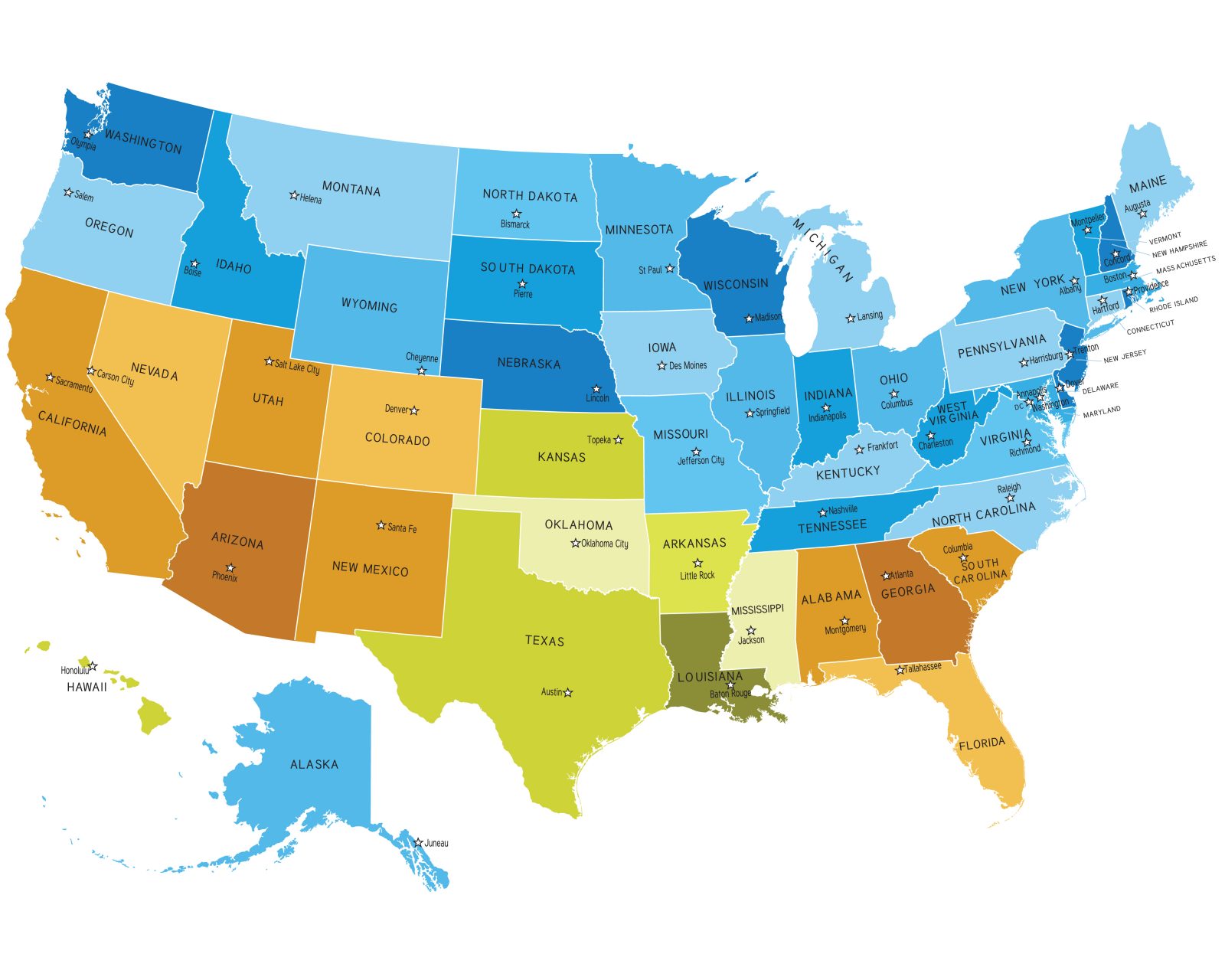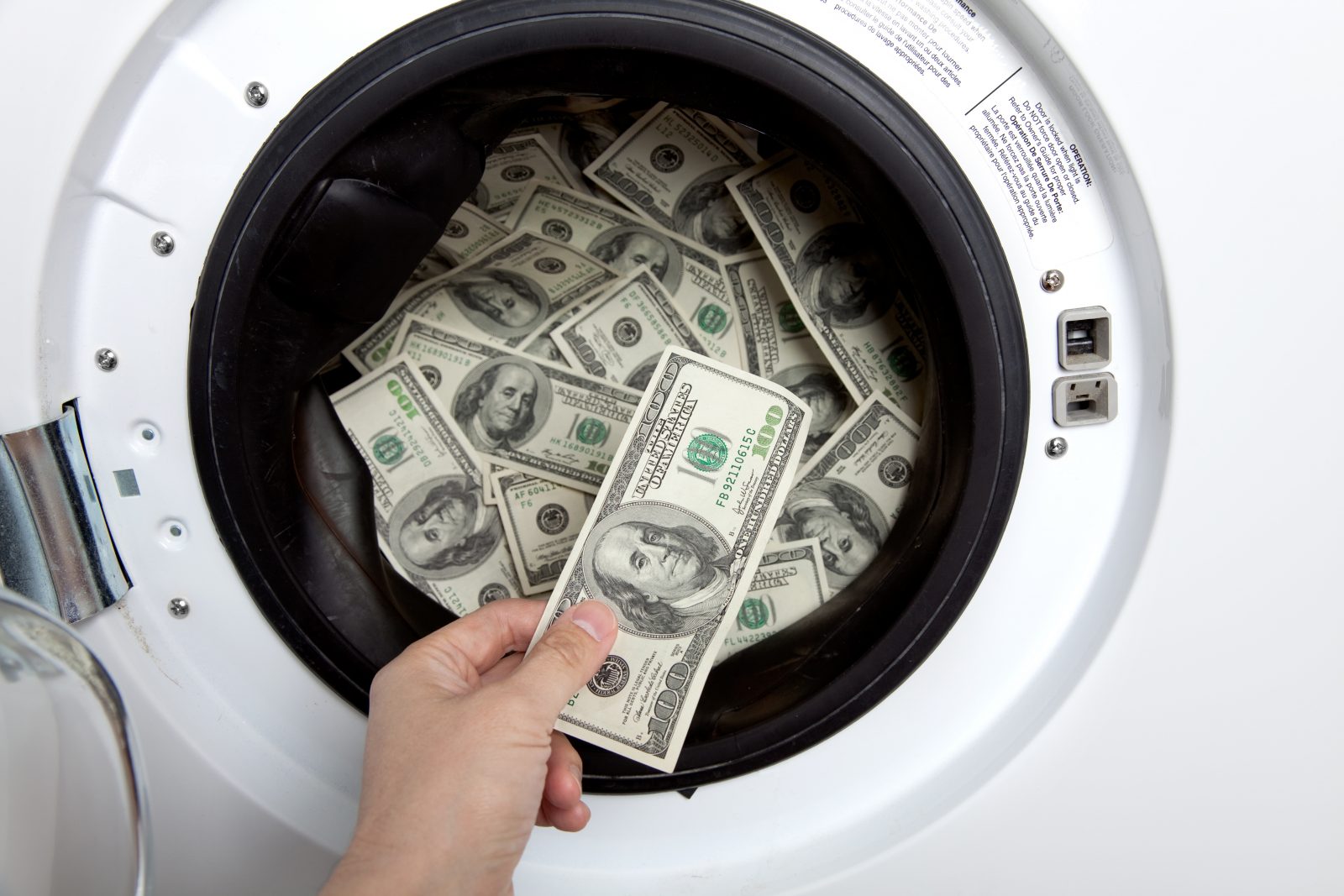The risks of money laundering in the US differ in each state
Publication date 12-05-2022
By Erik Reissenweber (AMLC)
Journalistic sources, such as the International Consortium of Investigative Journalists (ICIJ), regularly publish disconcerting news about some states within the US that set a legal basis for offering secrecy to financial institutions. In the process of making an assessment of the geographical risks, the institutions that have the obligation to report pursuant to the Money Laundering and Terrorist Financing (Prevention) Act (Wet ter voorkoming van witwassen en financieren van terrorisme or Wwft) tend to consider the US to be one country. It would be better for those institutions to distinguish between the different jurisdictions within the US and between the relevant integrity risks which pertain to doing business with customers.[1] It will not be a surprise to many that from 2020 onwards the US already had a well-founded second place on the list of the Financial Secrecy Index of the Tax Justice Network[2], just below the Cayman Islands.

The Pandora Papers and the US
In the beginning of October 2021, the International Consortium of Investigative Journalists (ICIJ), leaked financial papers which are known as the “Pandora Papers”[3]; the papers consist of more than 11.9 million confidential papers from 14 offshore service provision companies in many different countries. The publication of these papers follows similar publications such as the Panama Papers (April 2016) and the Paradise Papers (November 2017). Contrary to earlier leaks, the United States had a more prominent role in the Pandora Papers, particularly as an off-shore destination in itself. One of the most significant points which make the Pandora Papers different from other large offshore leaks is how the investigations revealed the secrecy in the jurisdictions in the United States and the country coming up as a hub of offshore money. One of the more spectacular revelations from the Pandora Papers was the revelation that King Abdullah II of Jordan was using shell companies in the British Virgin Islands to buy a Californian mansion of 23 million Dollars, in addition to other property. While the United States as the biggest lender of bilateral assistance and the US has invested more than 1.5 billion Dollars in 2020 in Jordan. A large part of this financial assistance is being used for personal enrichment and offshore areas are being used, such as some American jurisdictions, in this event America itself.
The assessment of geographical risks is an obligation
On the basis of the Money Laundering and Terrorist Financing (Prevention) Act (Wwft), institutions have the obligation, at a customer level, to make an assessment of the risks of money laundering and the financing of terrorism and to keep it up-to-date. During such risk assessment, an institution takes the risk factors into account which relate to matters such as the type of customer, the product, the service, the transaction and the delivery channel and naturally also the countries of the geographical areas.

Countries of geographical areas are relevant
In practice, the institutions with the obligation to report pursuant to the Wwft continuously check on their customers and if the customers are business customers, checks on the natural persons are carried out as well, during onboarding, remediation and reviews against the lists with high-risk countries. The European Commission[4] and the FATF[5] typically provide such lists. The AMLC also conducted research into risk countries for offshore companies in the past[6].
The institutions with the obligation to report pursuant to the Wwft may continuously keep up such lists and they might bring the lists up-to-date periodically, or as a result of an incident or alternatively, they might buy a list from a commercial party, but at any event, such lists must be kept up-to-date on the basis of a variety of relevant sources[7] which means that a constant flow of new information is generated. These lists tend to almost always be focused on countries as a whole. The question is whether this method sufficiently enables institutions with the obligation to report pursuant to the Wwft to make a proper assessment of the geographical risks.
The American Constitution[8] provides for the authority to federal state governments to adopt legislation which is not under the control of the federal authorities or legislation over which the Constitution stipulates that the state has no control. The legislation the states are allowed to adopt themselves include education, family law, contract law, components of criminal law and financial/tax legislation.
The institutions with the obligation to report pursuant to the Wwft that lump together customers, flows of money and transactions from the United States, are therefore not capable of making an assessment of the specific risks posed by doing business with entities in particular states in the United States. As a result, they run a serious risk not to know their customers sufficiently which might lead to involvement in money laundering or an undesirable avoidance of taxes by their customers.
The majority of the states in the US have robust anti-money laundering legislation. However, the Pandora Papers have revealed numerous trusts[9] which are linked to foreign interests in South Dakota (81), Florida (37), Delaware (35). Texas (24) and Nevada (14). On the basis of the Pandora Papers, investigative journalists pointed out that almost 30 out of the 206 trusts based in the US, representing a value of more than 1 billion Dollars, are linked to foreign persons and companies accused of wrongdoings. Many of such assets have been transferred to the United States following recently adopted tough legislation in other jurisdictions in relation to offshore assets.

US from Washington worldwide leader in anti-corruption
According to Casey Michel[10], the US - i.e., federal, from Washington - is still the worldwide leader in anti-corruption. It is claimed on the basis of the Foreign Corrupt Practices Act and the special DOI task force. However, changes seem to be on the increase as the National Risk Assessment from 2018 from the United States[11] already states that there is risk of misuse of legal entities to hide a criminal Ultimate Beneficial Owner or an illicit source of funds:
Misuse of legal entities to hide a criminal beneficial owner or illicit source of funds had been reported by law enforcement as a common feature of money laundering and corruption schemes.86 Bad actors consistently use shell companies to disguise criminal proceeds and U.S. law enforcement agencies have had no systematic way to obtain information on the beneficial owners of legal entities. The ease with which companies can be incorporated under state law, and how little information is generally required about the company’s owners or activities, raises concerns about a lack of transparency. However, when a legal entity formed in the United States opens a U.S. bank account to launder domestic illicit proceeds, this has not proved to be a major impediment to law enforcement investigations although it may slow them down. It may significantly slow down investigations or require the use of more resource-intensive investigative techniques, but not stop them altogether. Additionally, not all U.S. states require the same level of information about their companies, and for companies formed in some states, investigators are may have very few leads to follow besides the name of a corporate registered agent.
Much more challenging for law enforcement are those circumstances in which funds deposited in the United States in an account held in the name of a legal entity are transferred abroad to an account also held in the name of a legal entity, or when funds originating abroad are transferred to the U.S., again to and from accounts held in the name of a legal entity. Complex ownerships structures featuring layers of corporate entities, trusts, or nominee owners—punctuated by the involvement of foreign natural or legal persons—also present investigative challenges. The shares of shell companies may also be transferred, which effectively changes the ownership of the companies’ assets. Another related issue is shelf companies. They are essentially shell companies available “off the shelf,” but which often have been incorporated in the past to make them appear “established” to outsiders; they are attractive to criminals looking for ready-to-use legal entities.
American states adopt their own financial laws and tax laws. Particularly the smaller states such as Delaware[12] [13], Nevada[14] [15], Wyoming[16] [17] and South Dakota[18] [19] have created favourable conditions to hide the assets of extremely wealthy persons, from places including the Eastern bloc. It is a result of these states allowing legitimate anonymous shell companies and anonymous trusts. A ‘race to the bottom’ has come about between these states through the offering of as much anonymity to be as attractive as possible to very wealthy people, including people who line their own pockets. These states allow assets or illegally acquired assets to be transferred to financial service providers and they offer financial services without asking questions about the identity of a customer or the origin of the assets or the regulations allow many exceptions. In 2015, Jan van Koningsveld already briefly focused on offshore areas in this doctoral dissertation in which the topic concerns a list of countries with misused ‘Corporate Vehicles’ in corruption cases[20]. Meanwhile, there are also legislators in the US who want to restrict secrecy, but introduction of this legislation may take some time.[21] Any parties active in sectors such as real estate, luxury goods, art and private equity, lobby via lawyers, accountants, trust offices and real estate companies in these states to adapt the regulations for the benefit of these very wealthy people. Consider the exceptions in having to report unusual transactions. These industries have become rich over the past decades by the provision of services to very wealthy people and they can fairly easily pay for influencing the regulations. Real estate has had an exceptional position in the anti-money laundering regulations in America, in the process of which those involved did not have to be identified[22] and it is not until now that something is done about it. Trump’s real estate companies were demonstrably involved in investments by dictators and very wealthy people from all over the world[23] [24].
A lobby of lawyers’ collectives
The American Bar Association[25] also plays a significant role in the creation of possibilities for very wealthy people to secure assets in the US, which was revealed by the human rights organization Global Witness in February 2016. Such law firms do not only offer support in court but they also offer PR and lobby services, they set up letterbox companies for their customers, they help customers with buying real estate and avoiding anti-money laundering regulations[26] [27].
The exchange of information on tax avoidance with the US
The Foreign Account Tax Compliance Act (FATCA, 2020) plays both an important and a dubious role: By way of these regulations, America obliges foreign institutions that have an obligation to report possibly via their foreign tax authorities to report on their American citizens to the American tax authorities, i.e., the Internal Revenue Service or IRS. The reciprocity of FATCA is imbalanced; the US receives far more information from abroad than foreign governments or institutions receive from the US. People who are resident outside the US put up their assets in America which means the assets are safe and outside the reach of governments which might want to levy taxes on these assets. In addition, the United States is still one of the few developed countries that has not approved the multilateral reporting standard - Common Reporting Standard: CRS[28] - for the automatic exchange of information on financial data. The Organization for Economic Co-operation and Development or OECD describes the lack of starting the acknowledgement on the part of the United States: “the necessity for the United States to attain equivalent levels of mutual information exchange” and the “political commitment to strive for the approval of the regulations and the legislation to reach such equivalent levels of mutual automatic exchange.”The Pandora Papers may show more than ever in which way the jurisdictions of the United States have become an attractive place for wealth coming from abroad.
The foregoing emphasizes how thorough the Customer Due Diligence must be in respect of a customer or a transaction from one of the states referred to above. Due to a high-risk indicator, some of the institutions that have the obligation to report pursuant to the Money Laundering and Terrorist Financing (Prevention) Act request at all times supplementary documentation about the natural persons who are involved in the legal entity concerned or the transaction; in addition, they arrange for having such documents certified by a reliable American lawyer or a civil-law notary of their own choice. Whether the foregoing provides sufficient assurance will depend on the willingness of an institution to take a risk, in addition to being based on information offered here in respect of some of the states in the US.

Other interesting sources
- https://gfintegrity.org/report/acres-of-money-laundering-why-u-s-real-estate-is-a-kleptocrats-dream/
- https://open.spotify.com/episode/36nnPsUE696umZge0PxgSd?si=JDZkckWKR36PJITlbsecpQ
- https://www.nature.com/articles/s41598-017-06322-9
- https://brooklynworks.brooklaw.edu/faculty/1287/
- Outside the scope of this article, but the UK also has a dubious reputation: https://www.spotlightcorruption.org/money-laundering-asset-recovery/
[1] De cliënt is de natuurlijke persoon of rechtspersoon die diensten bij een Wwft instelling afneemt of een transactie laat uitvoeren.
[2] https://fsi.taxjustice.net/PDF/UnitedStates.pdf
[3] https://www.icij.org/investigations/pandora-papers/
[4] https://ec.europa.eu/info/business-economy-euro/banking-and-finance/financial-supervision-and-risk-management/anti-money-laundering-and-countering-financing-terrorism/eu-policy-high-risk-third-countries_en
[5] https://www.fatf-gafi.org/publications/high-risk-and-other-monitored-jurisdictions/documents/increased-monitoring-march-2022.html
[6] https://www.amlc.nl/wat-zijn-concealed-assets/risicolanden-project-offshore-vennootschappen/
[7] FATF, EU commissie, sanctielijsten van de VN, EU, US, Tax Justice Network, Financial Secrecy Index, Corruption perception index, etc
[8] https://www.amerika.nl/amerika/reisgids/amerikaanse-politiek/grondwet-van-de-verenigde-staten/
[9] https://www.forbes.com/sites/insider/2021/10/12/the-pandora-papers-shed-new-light-on-the-us-as-a-tax-haven/?sh=415317221f59
[10] onderzoeksjournalist, schrijver van het boek 'American Kleptocracy'
[11] https://home.treasury.gov/system/files/136/2018NMLRA_12-18.pdf, pagina 29 onder de titel Misuse of Legal Entities
[12] https://www.investopedia.com/articles/personal-finance/092515/4-reasons-why-delaware-considered-tax-shelter.asp
[13] https://www.theamericanconservative.com/articles/make-america-great-again-by-cracking-down-on-tax-havens/
[14] https://www.icij.org/investigations/pandora-papers/the-gatekeepers-who-help-open-america-to-oligarchs-and-scammers/
[15] https://www.companiesinc.com/start-a-business/nevada-business-advantages/
[16] https://www.icij.org/investigations/pandora-papers/the-cowboy-cocktail-how-wyoming-became-one-of-the-worlds-top-tax-havens/
[17] https://www.icij.org/investigations/pandora-papers/the-gatekeepers-who-help-open-america-to-oligarchs-and-scammers/?utm_source=ICIJ&utm_campaign=bec6d11c9f-20220405_WeeklyEmail&utm_medium=email&utm_term=0_992ecfdbb2-bec6d11c9f-83793774&ct=t()
[18] https://www.icij.org/investigations/pandora-papers/us-trusts-offshore-south-dakota-tax-havens/
[19] https://www.cnbc.com/2021/10/05/heres-how-states-like-south-dakota-have-become-global-tax-havens.html
[20] https://pure.uvt.nl/ws/portalfiles/portal/26825285/Koningsveld_Offshore_07_10_2015.pdf, blz. 203
[21] https://www.icij.org/investigations/pandora-papers/lawmakers-in-us-push-to-uncover-riches-shielded-by-state-secrecy-laws/
[22] https://www.federalregister.gov/documents/2021/12/08/2021-26549/anti-money-laundering-regulations-for-real-estate-transactions
[23] https://www.globalwitness.org/en/campaigns/corruption-and-money-laundering/trumps-luxury-condo-a-congolese-state-affair/
[24] https://qz.com/africa/1591638/congo-president-allegedly-laundered-millions-through-trump-condo/
[25] https://www.americanbar.org/en/
[26] https://www.youtube.com/watch?v=rFAgQNeAjmQ
[27] https://www.youtube.com/watch?v=j8pgI60GrvU
[28] CRS voorziet in het door Wwft-plichtige instellingenvaststellen en vastleggen van de fiscale woon- of vestigingsplaats en enkele financiële gegevens van rekeninghouders. De financiële instelling geeft gegevens door aan de lokale belastingdienst, die op haar beurt het land waar de rekeninghouder woont informeert.
